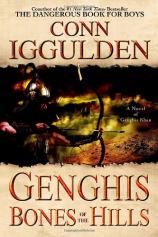Genghis: Bones of the Hills
Review
Genghis: Bones of the Hills
Genghis Khan had a little sister. The histories don’t say
that much about her, and even in Conn Iggulden’s fictional
trilogy (of which this is the concluding volume), she’s a
supporting character at best. But think about it. Here you are,
Genghis Khan --- ruler of the Mongol nation, scourge of the plains,
assaulter of cities, terror of medieval China, getting ready to
descend on the Arab nations like the judgment of a particularly
cruel archangel --- but you also have to spend a little time
dealing with family issues, like your little sister’s
wedding, and whether or not to promote your brother-in-law to
command part of your legions. It’s tough being the great
Genghis Khan.
Don’t get me wrong. The business with Genghis’s
sister is a tiny portion of the book, almost an aside. I call
attention to it mostly because of the importance of family affairs
to the novel and how the conflicts within Genghis’s family
threaten --- but never quite manage --- to drown the entire
enterprise in soap-opera schmaltz.
If you were paying attention in the prior novels, Genghis had
four legitimate sons. (Iggulden, perhaps rightly so, leaves out any
mention of the 16 million people walking around today who are
descended from Genghis, which can largely be attributed to his
penchant for rape.) The oldest, Jochi, might easily have been the
son of a Tartar rapist. The issue of his parentage and the
succession of the next Mongol emperor is the most prominent subplot
in GENGHIS: BONES OF THE HILLS and threatens at times to sink the
novel deep in the fever swamps of dynastic politics.
That the story never quite manages to veer off entirely into a
convoluted family struggle is in part due to the main character
himself. Genghis Khan was just the sort of individual who was able
to take a (relatively) trivial insult to his person --- in this
case, the murder of an advance scouting party in modern-day
Afghanistan --- and turn it into massive carnage on the heroic
scale. Genghis, bored with the time-consuming business of tearing
down the walls of Chinese cities and starving out the population,
decides to move his forces south, towards the great Arab cities of
Samarkand and Merv, in response to what Iggulden calls “one
of the worst military decisions in history.”
Genghis, accompanied by his sons and generals, is immediately
faced by one of the few military forces able to stand up to the
Mongol assault --- fierce Arab warriors, fighting on their home
turf, with manpower three times the size of the horsemen.
Iggulden describes, in loving detail, the progress of the battle,
the strategies of the great general Tsubodai, and the carnage of
the Arab counterattack against the Mongol camps.
Although the battles form the backbone of GENGHIS: BONES OF THE
HILLS, Iggulden also includes some very nicely done set pieces to
keep the reader engaged and involved. The struggle between Jochi
and his father is illustrated by Jochi’s decision to fight a
captured tiger, a tale told with gusto and written in blood and
scars. Even Genghis’s enemies get a share of the story, with
the flight of the Arab shah and his sons from their defeat on the
battlefield taking prominence in the center of the book.
Genghis Khan was a wanderer, and there is a wandering quality in
this final installment of Iggulden’s trilogy. Too much time
is spent on peripheral issues that could have been better devoted
to bloodshed, and his Genghis seems to speak a language that
consists mostly of grunts and platitudes. But Iggulden is an able
writer who manages to convey the reasons behind the Mongol military
superiority as he sketches out their victories (and the occasional
defeat). GENGHIS: BONES OF THE HILLS is a fitting conclusion to
Iggulden’s saga, and although it isn’t as focused or as
disciplined as the first two, there is still a sadness at the final
fate of the great Genghis Khan --- not least because there
won’t be a fourth book.
Reviewed by Curtis Edmonds, who writes the "Northbound" blog at http://www.txreviews.com/blog. on January 22, 2011
Genghis: Bones of the Hills
- Publication Date: March 24, 2009
- Genres: Fiction, Historical Fiction
- Hardcover: 416 pages
- Publisher: Delacorte Press
- ISBN-10: 0385339534
- ISBN-13: 9780385339537











